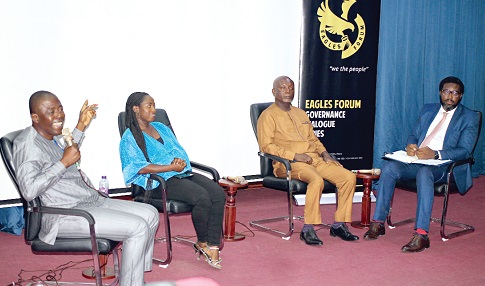
Expand economy to absorb unemployed youth - Development Economist
A Development Economist, Nicholas Issaka Gbana, has highlighted the need for the government to expand the economy as a matter of urgency.
That, he said, would help absorb and keep pace with the increasing number of graduates being produced by tertiary institutions.
Advertisement
Mr Gbana was delivering a lecture on the topic: “The unemployment crisis: Dimensions and solutions," at the second governance dialogue series of the Eagles Forum, a think tank in Accra last Tuesday.
Mr Gbana also suggested the need for the government to pursue what he described as “a strong, inclusive and sustainable” economic growth agenda.
That, he said, would enable the government to address the low and inconsistent economic growth recorded over the years.
Issues such as low innovations, low structural economic change and a stagnated manufacturing sector must also be paid attention to.
Another way out of the unemployment predicament, the economist said, was for the government to help “stimulate demand for made-in-Ghana products".
He further called for partnership between the government and civil society organisations to ensure effective implementation and delivery of programmes for better outcomes.
Mr Gbana, however, advised against the politicisation of development interventions aimed at addressing youth unemployment.
Statistics
The economist also advocated that the Ghana Statistical Service (GSS) be provided with the necessary resources to enable it to gather quality data to publish monthly reports on the state of the country's unemployment rate.
“On unemployment matters, we need data. We don't have to wait for population census every 10 years or on Ghana Living Standards Survey (GLSS) every four or five years to know what is happening on the labour front,” he said.
According to Mr Gbana, the Eagles Forum Election 2020 survey, the Centre for Democratic Development (CDD) Ghana post-election survey, and the GLSS 7 of 2017, all pointed to the fact that unemployment was the topmost issue on the minds of citizens.
“The GSS 2021 Population Housing Census showed that 33 per cent of the youth between the ages of 15 and 24 and older were unemployed,” he said.
The report also showed that 54 per cent of the unemployed were female while 46 per cent were male.
The development economist has 30 years of experience in his field of work.
Mr Gbana is currently the Global Lead for Supportive Business Ecosystems at Solidaridad, an international development organisation.
He has also led the design and implementation of economic growth programmes in West Africa that created jobs, increased productivity and incomes, and enhanced decent work.
Mr Gbana is also an executive member of the Eagles Forum. The forum is a movement that galvanises progressive Ghanaian professionals worldwide to share in their social democratic ideologies.
Low confidence of women
The Chief Executive Officer of DeZigner Foods and Spices, an agro-processing company, Grace Twumasi, said one of the major reasons for the high female unemployment rate was low confidence.
She said most job-seeking women did not like applying for jobs they wanted because they felt they did not meet all the criteria.
“Men apply for jobs even if they only have 50 per cent of what is required while women always want to have a 100 per cent requirement before seeking for the jobs they want,” Ms Twumasi observed.
The Country Lead for FootPrince Bridge International, an entrepreneurial development NGO, Baba Adongo, also stressed the need for proper targeting in the implementation of policies.



